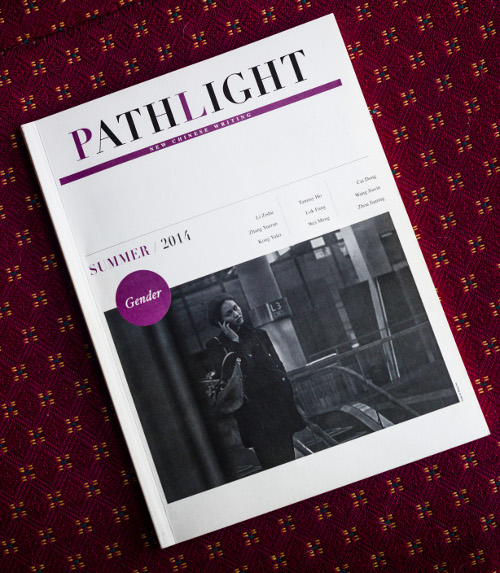It seems only natural that a coffee shop called The Bookworm should publish its own line of books. Founded in early 2015, the China Bookworm Press is the next stage in the development of the lending library, turned literary hub.
The Bookworm Press, created with an aim of publishing leading contemporary fiction and non-fiction from China (in both the original Chinese and to a wider international audience in translation), joins a growing raft of book salons, author talks and literary festivals appearing across the capital.
Though perhaps better known today for staging its popular annual Literary Festival, the independently owned Bookworm is hoping to raise awareness of its publishing arm – and Chinese literature in general – through its inaugural China Bookworm Literary Award.
The award, which selects a previously unpublished novel by a Mainland Chinese writer, was last month awarded to 34-year-old Guangzhou native Wang Zhezhu (pictured above) for her novel The Train That Came To Its End. The Bookworm’s panel of judges hailed the novel – about a doomed train and the passengers onboard – as “a small gem.”
Runners-up included Li Ziyue (pictured below) with I Am in the Red Chamber, You Are on the Journey to the West, “a biting satire” about the great social divide between rural and urban China, and Lin Weipan’s When a Cloud Meets a Sheet of Paper – a “refreshing and whimsical” tale about two boys in the countryside, with elements of magical realism and streams of consciousness.
As well as monetary prizes for the top three winners, publication in English awaits the first and second prize novels. Wang is “very happy” for the chance to have her writing translated for the first time. “I think this win will open another path [of] exchange and opportunities,” she tells us during an interview.
The addition of the Bookworm Press highlights the Beijing literary scene’s growth and burgeoning importance, suggests Peter Goff, managing director of the China Bookworm Press. Goff says that while the Press is relatively new and the benefits yet to be seen, its aim is to be a, “platform to introduce Chinese writers to the wider world.”
Nor is he focusing exclusively on Beijing. “At a recent Bookworm event in Chengdu, there were about 200 people in their 20s who [were] passionate about Chinese literature. The young generation [of readers] makes the developing scene a vibrant one.

As well as heightened interest in Chinese literature within China, there’s also a gradual increase in interest from international publishers, according to Eric Abrahamsen, founder of Paper Republic, an organization that facilitates both literary and publishing connections between China and the world. He was also a judge on the Bookworm Award panel. One of Paper Republic's projects is Pathlight magazine, which features English translations of contemporary Chinese fiction and poetry.
Abrahamsen believes China’s increased attention to literature is, “probably attributable to a gradual increase in the number of direct connections between Chinese writers and publishers, and their international counterparts.” He gives examples of international literary festivals and residencies, which provide the chance for authors to be “discovered” by editors and journalists.
Despite this sizeable appetite for literature, there are still many challenges facing young Chinese writers hoping to have their works published or translated, as Goff explains: “It’s an incredibly competitive market, and not every work is readily translatable due to it being too local or its style of writing too difficult.”
Abrahamsen agrees, stressing that many younger Chinese writers are “still struggling with the question of whether they should be ‘topical’ and write to fit with perceived trends, or whether they should just say ‘to hell with it’ and write what they want to, without thinking too much about how it will be received.”
It’s a difficult position with no easy way out – play it safe and take the money, or opt for creative freedom (of sorts) that may, on the contrary, prove inhibiting? Chinese writer Murong Xuecun chose to stop altogether. He’d sold two million copies of his eight books and garnered more than eight million social media followers. But he quit publishing last year after frustrations with censorship.
For writers, it ultimately comes down to a willingness to take the risk. “There’s actually an interesting parallel with China’s economic reforms. In the 90s, as the state-owned danwei [work units] were slowly dismantled, everyone was terrified of trading in the safety of their government-backed jobs for the uncertainty of the private sector. The metaphor was xiahai, or ‘leaping into the sea,’” explains Abrahamsen.
Time will tell whether emerging Chinese writers choose to toe the line or jump over it. But as long as initiatives that focus on translating works like the China Bookworm Press and Pathlight exist, Chinese writers will continue to have the opportunity to have their voices – in whatever form that may take – heard. And for readers, this can only be a good thing.
The English translation of Wang Zhezhu’s novel The Train That Came To Its End and Li Ziyue’s I Am in The Red Chamber, You Are on the Journey to the West, will be published in March 2016 via China Bookworm Press.





















0 User Comments